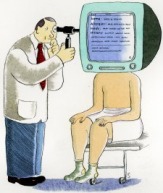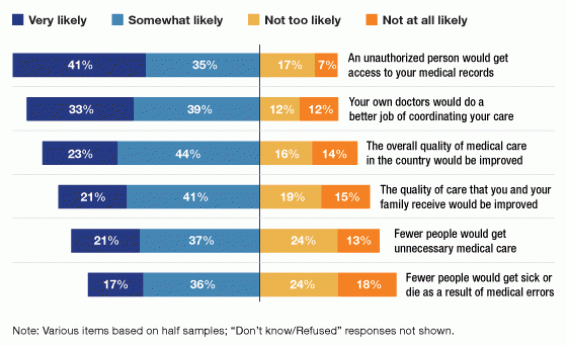Electronic Medical Records
Home

Today there is a heated debate about whether medical records should be computerized. Especially in light of the media frenzy over new health care legislation in the United States, it is crucial to evaluate this advancement. Is it more efficient? Does it reduce or increase the number of errors? What are the privacy implications versus the benefits to sharing data? If the benefits of computerized medical records seem to outweigh the costs, should implementation be optional or mandatory? The results of an NPR poll, shown below, indicate the diverse responses to such questions. While 76 percent of the respondents believe that it is very or somewhat likely for an unauthorized person to get access to their medical records if they are computerized, almost as many think that their doctors would do a better job of coordinating their care with electronic medical records (EMRs). It is difficult to reconcile the complex issues involved in this debate.
The above poll was taken from: http://www.npr.org/news/graphics/2009/apr/npr_polls/
Purpose of this Site
Given this multitude of questions that this issue raises, it is clear that this is a controversial topic. This issue is critical given what is at stake: the privacy of individuals’ medical records and the efficiency of one of the largest industries in the nation. As such, the risks associated with technological advancement are amplified by the scale of the application. Unlike computerizing other industries, computerizing the healthcare system has zero margin for error.
If a patient's medical record is released to the public, due to error or malicious attack, the breach could hurt the patient in a number of ways, varying from insurance coverage to career path. As such, any small error, insecurity, or inefficiency caused by EMRs are of extreme importance. It is not because the technology is particularly complex or controversial, but because of the importance and sensitivity of the application that EMRs is a difficult issue to resolve.
With the current state of implementation of EMRs, it is impossible to measure the total effects of a total overhaul of the system and answer these questions fully. More concrete data on the efficiency and the security of the information is needed because medical records are so important in society.
Site Organization
The website will discuss this issue of computerized medical records from several vantage points. We will begin with brief background page covering U.S. policy on EMRs and legislation enacted on EMRs. We will discuss two important facets of this complex decision. The first is the debate on whether this advancement is more efficient and will ultimately reduce the number of medical errors. The second is the controversy over privacy and whether the computerization of medical records threatens the privacy of the records, or whether pooling information will lead to quality improvement and better disease monitoring. Finally, we will conclude by placing this topic within the greater framework of this course, evaluating the impact on technology and society.
Purpose of this Site
Site Organization
The website will discuss this issue of computerized medical records from several vantage points. We will begin with brief background page covering U.S. policy on EMRs and legislation enacted on EMRs. We will discuss two important facets of this complex decision. The first is the debate on whether this advancement is more efficient and will ultimately reduce the number of medical errors. The second is the controversy over privacy and whether the computerization of medical records threatens the privacy of the records, or whether pooling information will lead to quality improvement and better disease monitoring. Finally, we will conclude by placing this topic within the greater framework of this course, evaluating the impact on technology and society.

Audio Listening
To listen to an NPR debate on EMRs, listen to the following recording:
http://www.npr.org/templates/player/mediaPlayer.html?action=1&t=1&islist=false&id=102481028&m=102481015
To listen to Brian and Anastasia discuss the issue, check out this podcast:
http://www.princeton.edu/~blevee/EMR/podcast.mp3weeblylink_new_window
* * * * *
The top picture from this page is from: http://www.acpinternist.org/i/observer/jan2002/computer_lg.jpg
The bottom picture is from: http://img.timeinc.net/time/daily/2009/0903/doctors_computers_0304.jpg
To listen to an NPR debate on EMRs, listen to the following recording:
http://www.npr.org/templates/player/mediaPlayer.html?action=1&t=1&islist=false&id=102481028&m=102481015
To listen to Brian and Anastasia discuss the issue, check out this podcast:
http://www.princeton.edu/~blevee/EMR/podcast.mp3weeblylink_new_window
* * * * *
The top picture from this page is from: http://www.acpinternist.org/i/observer/jan2002/computer_lg.jpg
The bottom picture is from: http://img.timeinc.net/time/daily/2009/0903/doctors_computers_0304.jpg

